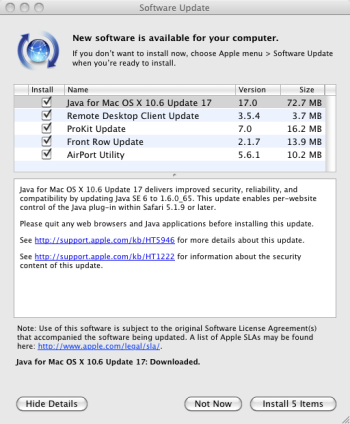So what’s the progress on the project? I uploaded a video about it a few days ago, and it re-peaked some interest in the project. I’ve been experimenting with making it work better and testing a few things out and so far it’s still not been super successful, especially with networking… I did however, get a smaller version of the image made, which is on Macintosh Garden still the entire same image nothing’s been changed except you can actually put it on a smaller hard drive partition now. Would love to see the beta or at least an alpha 4 soon 😃👌
Re progress:
I'm on my MacBook at the moment which doesn't have those projects - @Jazzzny shared some toolchain files a while back on the other thread Here which included cctools and gcc if you're interested in those projects specifically.
On the system i'm running at this moment i have the followingbuilt via darwinbuild and/or manually. I'm in the process of collecting anything else i have on the other machines and creating a table to put in the wikipost to collate all build progress and reports etc so we can all keep track of what we collectively have available.1. adv_cmds
2. amavisd
3. apache
4. apache_mod_bonjour
5. apache_mod_fastcgi
6. apache_mod_hfs_apple
7. apr
8. architecture
9. autoconf
10. automake
11. awk
12. bash
13. basic_cmds
14. bc
15. BerkeleyDB
16. bind9
17. bison
18. bison1
19. bootstrap_cmds
20. bsdmake
21. bzip2
22. CarbonHeaders
23. clang
24. CommonCrypto
25. CoreOSMakefiles
26. CPANInternal
27. CrackLib
28. crontabs
29. cscope
30. Csu
31. curl
32. cvs
33. cxxfilt
34. developer_cmds
35. disklabel
36. distcc
37. doc_cmds
38. efax
39. enscript
40. expat
41. FastCGI
42. fetchmail
43. file
44. files
45. flex
46. freeradius
47. gcc-5646
48. gcc_select
49. gdb
50. glibtool
51. gm4
52. gnudiff
53. gnumake
54. gnuserv
55. gnuzip
56. gperf
57. gpt
58. graphviz
59. grep
60. groff
61. headerdoc
62. ICU
63. IOACPIFamily
64. IOATAFamily
65. IOAudioFamily
66. IOBDStorageFamily
67. IOCDStorageFamily
68. iodbc
69. IODVDStorageFamily
70. IOGraphics
71. IOPCIFamily
72. IOStorageFamily
73. JavaScriptCore
74. ksh
75. less
76. libclosure
77. Libcpp_kext
78. libedit
79. libevent
80. libffi
81. libgcc
82. libiconv
83. libmd
84. libpcap
85. Libpcsvc
86. libtelnet
87. libutil
88. libxml2
89. libxslt
90. Liby
91. llvmCore
92. lsof
93. lukemftp
94. lukemftpd
95. mail_cmds
96. mailman
97. man
98. misc_cmds
99. modemccl
100. MySQL
101. nano
102. nasm
103. ncurses
104. neon
105. net_snmp
106. netcat
107. ntp
108. OpenBSM
109. OpenPAM
110. OpenSSL096
111. OpenSSL097
112. patch_cmds
113. pb_makefiles
114. pcre
115. pdisk
116. perl
117. portmap
118. procmail
119. pyOpenSSL
120. PyRSS2Gen
121. rcs
122. removefile
123. rsync
124. ruby
125. ruby_dnssd
126. ruby_libxml
127. RubyGems
128. RubyOnRails
129. SpamAssassin
130. srm
131. sudo
132. swig
133. SystemStubs
134. TargetConfig
135. tcl
136. tcp_wrappers
137. tcpdump
138. tcsh
139. texi2html
140. TimeZoneData
141. top
142. tsch
143. Twisted
144. UserNotification
145. uucp
146. vim
147. X11server
148. xar
149. xelf
150. xnu
151. zlib
152. zsh
Yes, I am aware of what @Jazzzny shared and I use some components from there (while other from darwinbuild and yet something just pulled over from 10a190/10a222), however the very problem is that everything is in pieces here and there, and everyone has slightly different toolchain, possibly not only with undocumented, but even unknown to oneself differences. This is fine as long as “this works for me”, but becomes a problem once someone asks why something fails for him and how to deal with that. One thing that MacPorts and similar package systems got right is that reproducible builds are important. This is what is lacking at the moment.
I think we need a completely standardized installer for the basic toolchain. There may be more than one of them, by the way, we have no obligation to install exactly same versions of everything which an archaic Xcode happened to have. Say, there may be a) Xcode 3.2.6 tools with restored ppc slices, otherwise identical to the release, b) updated Xcode tools, from some newer versions of Xcode (what MacPorts does, but can be different versions of course), c) different tools, aimed for developers (for example, Iain’s darwin-xtools). But in result it should be a) easy for any non-expert user to install a given toolchain from scratch, b) easy for any expert user to reproduce exactly identical set-up on another system without cloning and copying anything, c) easy to understand what a given user has on his machine, as long as he installed one of these toolchains, so that debugging is feasible based on logs.
I will test xtools moved into /usr/bin by the way. May not be a choice for everyone, but can be promising.
P. S. Did you build xnu via darwinbuild or manually?


